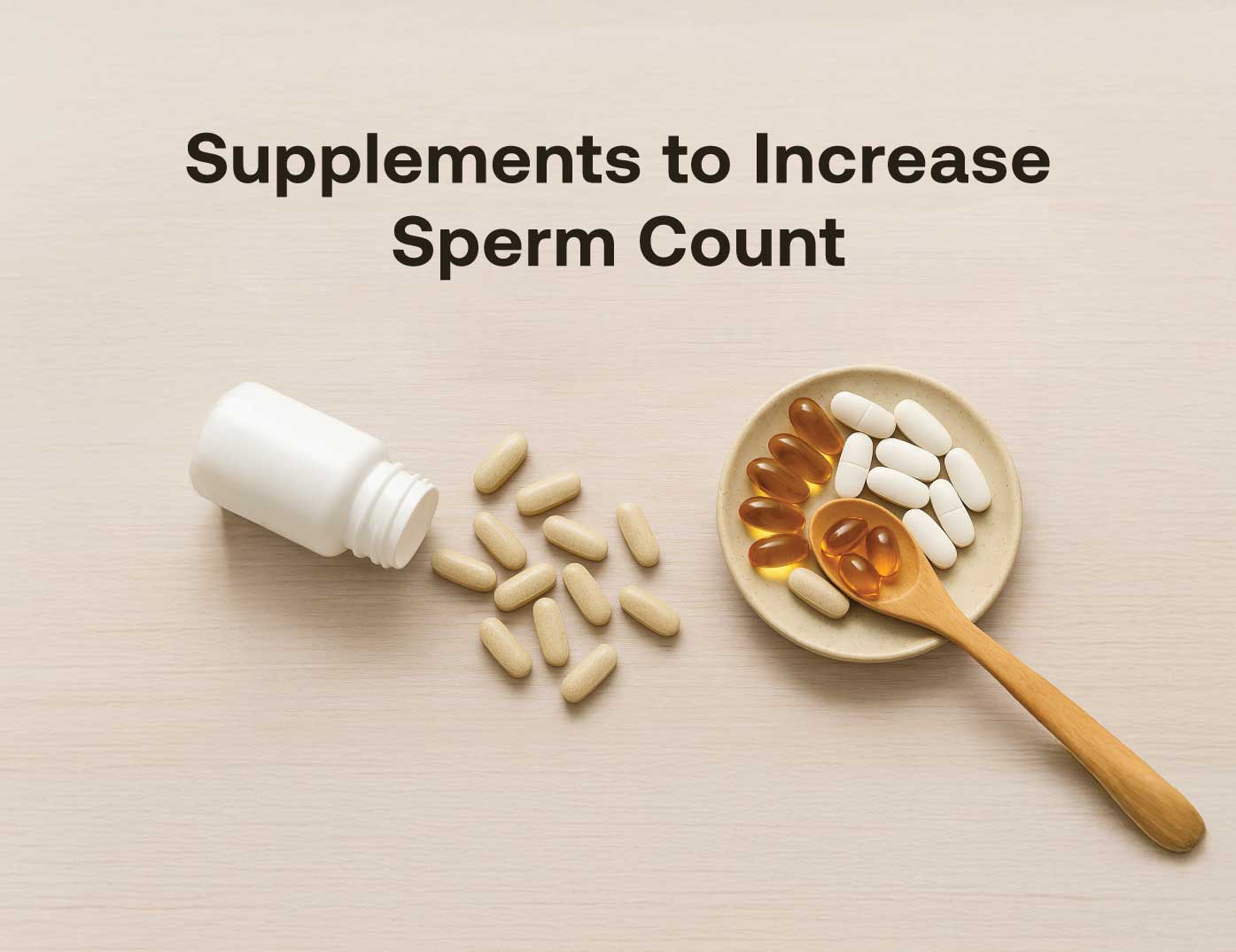Table of content
Maca root, a Peruvian tuberous plant, has been cultivated and used medicinally for at least 2000 years. This potent herb thrives in the cold Andes region of South America, where it has long been touted for its energy and fertility benefits. Today, Maca is ground into a powder and commonly found in a variety of supplements.
Aside from being a stress-fighting adaptogen, Maca also contains fiber, protein, iron, vitamins, minerals, and amino acids. You can find red, yellow, or black Maca. Their compositions are similar, though red Maca contains slightly higher antitumoral and antioxidant-promoting compounds.
As you can probably tell, there are numerous health benefits associated with Maca. However, Maca is most renowned for its fertility-promoting qualities, such as boosting libido, balancing hormones, and increasing sperm health. Are you curious about this superfood for male and female fertility? Let's dive in and learn more about maca root for fertility!
How Does Maca Root Help Fertility?
Maca works to support fertility in a few different ways. The first is by increasing libido. Traditionally given as an aphrodisiac, today, we know more about Maca's libido-boosting properties. Libido, or sex drive, is an important consideration when trying to conceive. One study found that ingesting Maca increased male libido, ultimately promoting fertility.
Additionally, Maca helps to balance hormones. While the studies regarding maca and hormone levels primarily pertain to menopause, there may also be fertility benefits. Maca is believed to help regulate a woman's cycles, aiding those trying to conceive.
Finally, Maca is thought to improve semen health and production. One 2006 study found that men experienced more significant semen volumes when Maca root was taken regularly. Other male benefits include lessening erectile dysfunction issues, improved sexual function, and better semen health.
For both men and women, Maca can be a powerful dietary addition.
Male Fertility and Maca Root
Many male fertility supplements contain Maca root, and for a good reason. Maca root aids male fertility by enhancing libido and sexual function, improving sperm quality and quantity, and helping to balance hormones.
Maca does not contain hormones but can help to nourish your endocrine system. Its positive effect on your pituitary, adrenal, and thyroid glands aids fertility. Known as an endocrine adaptogen, the nutrients within Maca support hormone production and assist the body in regulating and using its hormones. This can make a difference in the function of other glands, most notably the testicular glands, for men.
A handful of studies have found that Maca root can make a difference in male semen quantity and quality. This includes seminal volume, sperm count, and sperm motility. It's clear that Maca promotes male fertility in various ways, both physically and mentally.
Female Fertility and Maca Root
The benefits of Maca for females mainly have to do with its ability to balance hormones and regulate cycles. As discussed above, though Maca doesn't have any hormone compounds, it does play a role in supporting the endocrine system. This can allow your body to better regulate its own hormone production. Balanced hormones can lead to regulated menstrual cycles, making it easier to time ovulation.
Additionally, as an adaptogen, Maca helps to fight stress. Stress and fertility don't share a known link, but they are believed to affect one another. Ayurveda believes that if the field and timing aren't right, meaning the mind and body face external stressors, conception is less likely to occur. Taking maca root for women's fertility can help calm you and even lower blood pressure, as found in one study.
Maca has similar libido effects on women as it does on men. It's a natural aphrodisiac, helping to improve strength, vitality, and energy. This can be a welcome benefit for women who struggle to "get in the mood" due to hormones or lifestyle factors. Furthermore, if you're trying to cut down on caffeine while trying to conceive, consider replacing your morning cup of coffee with Maca!

Maca Root's Preconception Benefits
Maca root has benefits beyond increasing fertility. Its high mineral and vitamin content make it an excellent pre-conception supplement if you want to nourish your reproductive system, promote healthy eggs, and support sperm quality.
As a superfood, Maca is rich in potassium and iron while containing iodine, iron, manganese, zinc, copper, and vitamins B1, B2, C, and D. amazingly, Maca is considered a complete protein, too; meaning it has the nine amino acids your body is unable to produce.
This doesn't decrease the importance of having a well-rounded diet when trying to conceive. But it does highlight the nutritional boost that maca root can offer, helping to support healthy reproductive systems in both males and females.
Safety and Precautions for Maca Root
Maca powder is so easy to add to almost everything. However, you can overdo it. Taking a supplement containing Maca is an excellent way to get your daily dose without exceeding the suggested limits.
There's no specific research on too much Maca, but researchers can guess its side effects. Potential symptoms include jitteriness, insomnia, and mild digestive issues.
The recommended dosage comes from studies that have looked at its effectiveness. Most users can benefit from 2,000 milligrams to 3,500 milligrams each day. You may want to ease into it if you're new to Maca, though side effects are rare, and most people's bodies acclimate quickly.
One important thing to note is that Maca can pose a problem for people with specific health issues, like endocrine or auto-immune disorders. This is because it does impact your endocrine system, like your thyroid, and may affect function. Additionally, it's unknown whether Maca affects birth control, pregnancy, or breastfeeding.
There are always risks and benefits to consuming supplements. One of the known pregnancy risks has to do with unintended lead exposure, which is often the result of choosing low-quality Maca. If you're nursing, pregnant, or using birth control, it's recommended to talk with your doctor before taking Maca.
Fertility Benefits of Maca
Maca is a potent fertility supplement for both men and women.
It Has Aphrodisiac Properties
For centuries maca root has been used as an aphrodisiac. It helps boost libido, increases energy and stamina, and supports vitality.
These properties may help men experiencing sexual dysfunction. Additionally, they can benefit women with reduced libido due to lifestyle stressors or hormone issues.
In general, an aphrodisiac is a positive dietary addition when you're trying to conceive.
Helps in Hormone Balance
Maca doesn't contain hormones, but it can positively affect your endocrine system and glands. It helps to promote hormone regulation while fighting things like stress that can impair hormone balance.
Balanced hormones are essential for regular cycles and healthy egg production for women. Men need hormonal balance for sperm quality and quantity. It's easy to see why each gender can benefit from Maca for fertility regarding hormones.
Improves Sperm Count
Studies have found a positive correlation between ingesting Maca and male sperm quantity and quality. Not only does it improve semen volume and sperm count, but it also supports sperm motility.
This may be due to the hormone regulating effects and the nutritional content that helps to nourish the reproductive system. Along with Maca's ability to increase sexual desire, greater sperm count can considerably boost male fertility.
Adding Maca to Your Diet
Maca powder has a slightly nutty flavor and can be added to various foods and beverages. However, perhaps the easiest way to ingest maca root is through a supplement. It helps to ensure you get the accurate dose; it's a quick and simple addition to your routine. Plus, you won't have to worry about measuring and mixing tricky powder.
Both our men's and women's fertility capsules contain Maca for healthy sperm quality, formation, and motility and improved female egg quality, hormonal balance, and cycle regulation. They're an effortless part of your healthy pre-conception routine.








